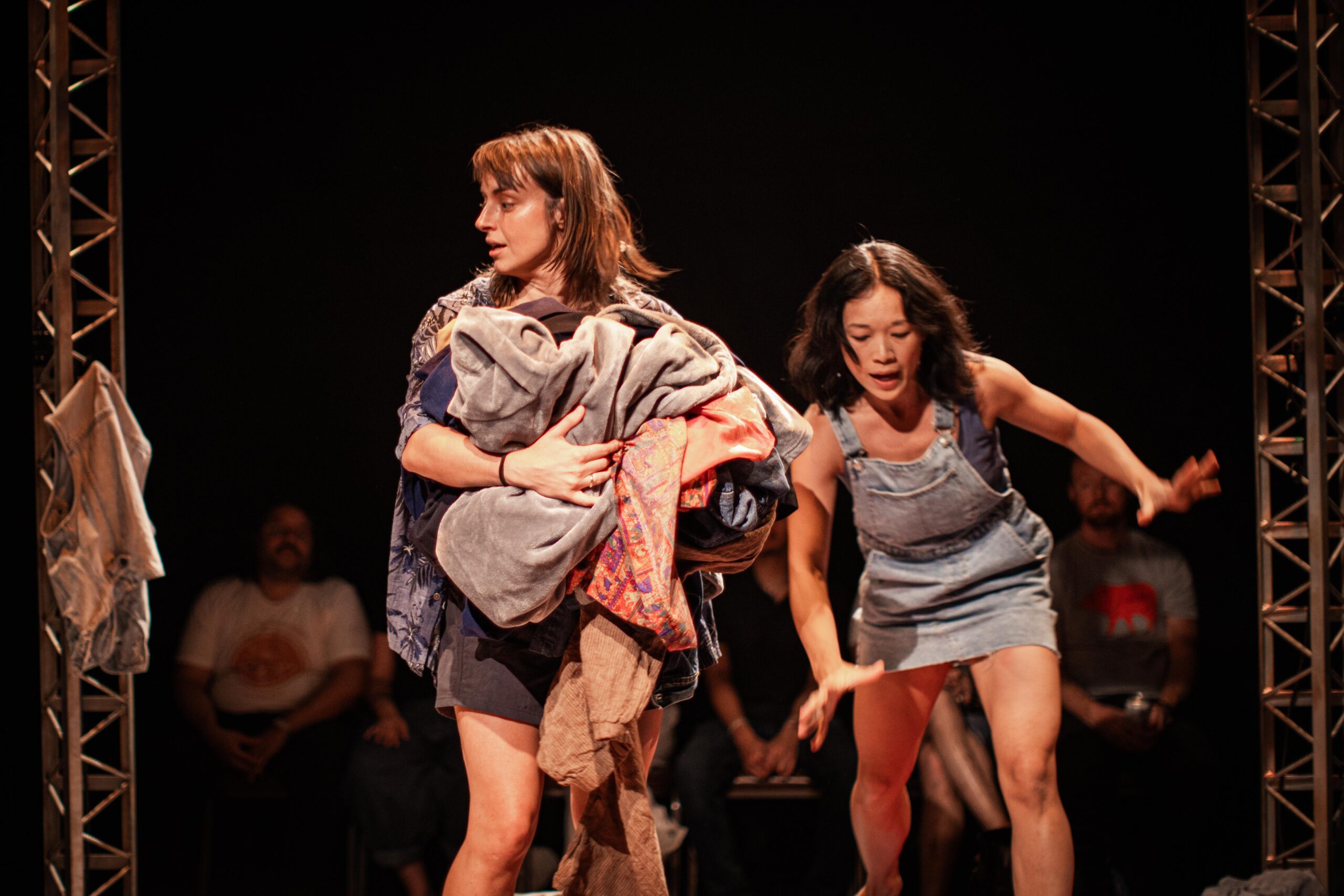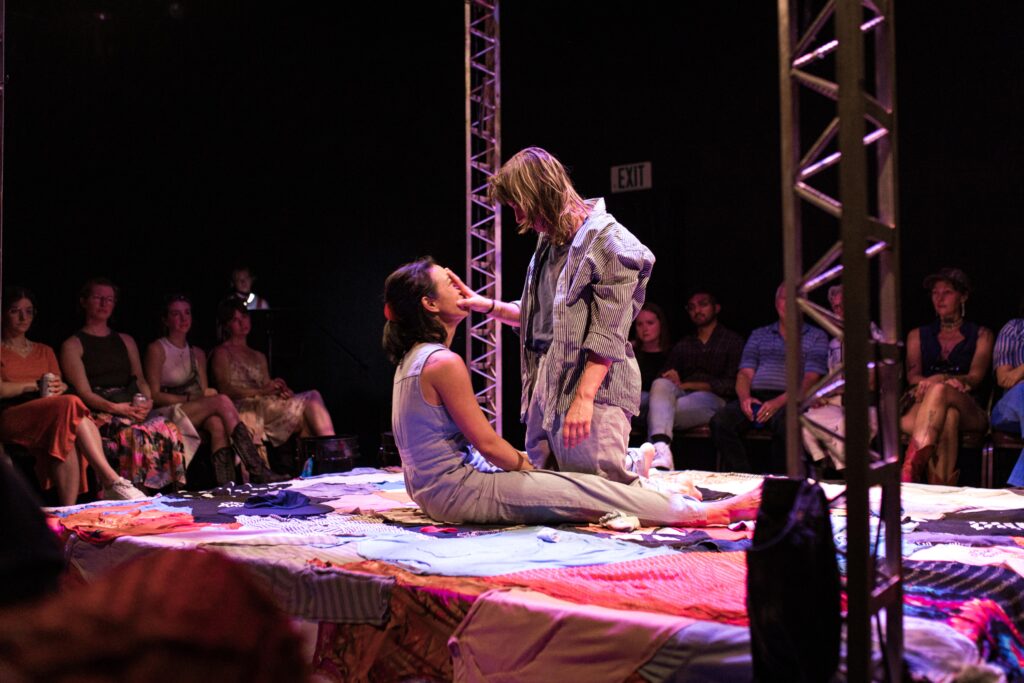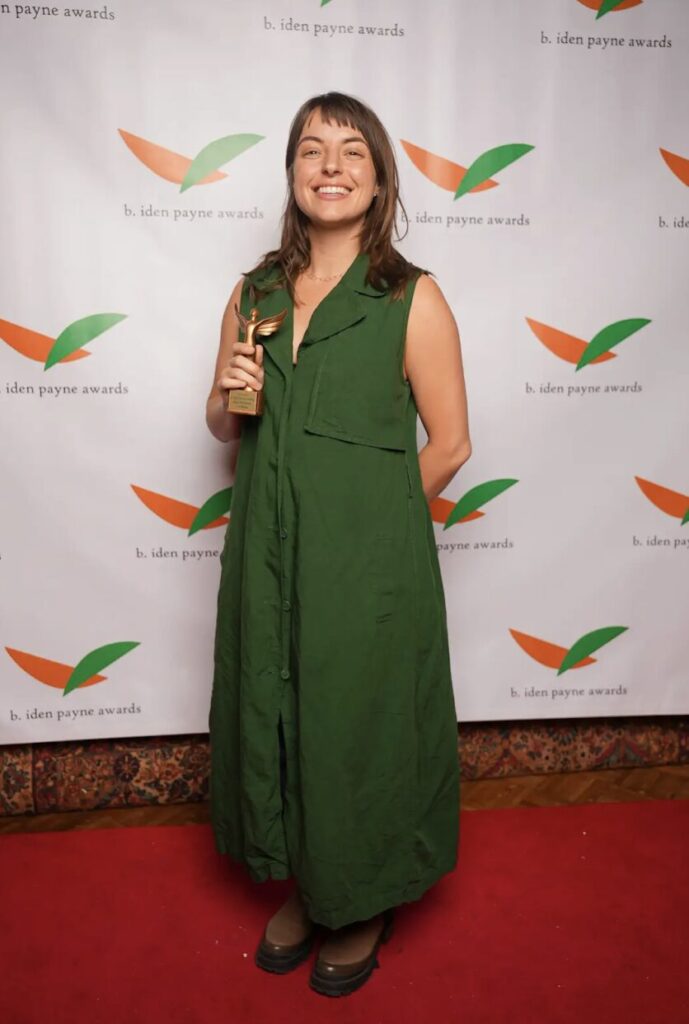What An Awe-ful Night

How Should A Conversation Be/By Malena Pennycook/Crashbox/August 2025
How Should A Conversation Be will probably survive everyone who saw it last summer. It will live a long exciting life, full of travel and experimentation. Yeah, that sounds grandiose, but I’m won’t take it back, because Malena Pennycook nailed a rare combination of general and specific. Her play is both about life itself–-a fact not lost on any mammal in the audience–-and about the very specific delight, impossibility, misery and sick comedy of communicating with other humans, particularly those we love.
All that is in this play. Here’s what’s not: sentimentality, mass-appeal heartstring-yanking, the victim’s predictable perspective, or sweeping conclusions about what it all means.
HSACB began as graduate school homework. Three years ago, when she was halfway through earning her MA in playwriting at UT, “[Professor] Kirk Lynn told us to write a `speech act’–a piece of language that invokes action,” Malena says. “I thought, it’s dumb, I’ll just make fun of it. I’ll make everything a speech act. And then I fell in love with it.”
That winter, during school break, she organized a creative sprint, in which a disparate group of writers and artists got together for three uninterrupted days, to produce–and maybe even finish–a piece of work. Malena turned the speech act assignment into the story of Kati and Terry, from their first meeting at the Very Gay Beans cafe in Denver, through the for-better-or-worse moments of their long relationship, culminating (in that version) in a random act of violence.
On the last day of the sprint, two actors read it, very fast, to a half-dozen people, including me. It didn’t take long to get the construct–Kati and Terry’s lines were the the action and the plot. Everything happened in the present tense:
HAPPY FIVE MONTH ANNIVERSARY
LETS OPEN A JAR
LETS GO SCUBA DIVING
LETS GET ON A PLANE
LETS GET ON A HORSE
WE COULD DO ANYTHING
ANYTHING
ANYTHING AT ALL
They blow kazoos
TERRY: You’re doing a thing I’m trying to figure it out
KATI: I’m being romantic
TERRY: But you’re just shifting your control in a different direction
***
KATI: I’m grieving in our room for three years.
***
At that point, HSACB consisted of two disembodied heads, talking a mile a minute, with nothing going on from the neck down, but the speed and simplicity blew the cobwebs out of my head. Over the next few years, Malena reworked the play at workshops and productions at the University of Washington, Stages (Houston), the Playwrights Center (Minneapolis) and the Playwrights Realm (Manhattan.)
“I was happy to have all these development opportunities,” Malena says, “but I kept thinking the readings were static. Equity rules say the actors have to sit at music stands, but in my mind, there’s always someone moving in this play.”
She talked this over with director Dan Hasse, an old friend from her undergraduate days at NYU’s Experimental Theater Wing. Dan lives and works in New York, but he saw the value of mounting a small, lean production in Austin. With support from the city of Austin’s Nexus Grant, a streamlined crew of collaborators could afford to live and rehearse here for a solid month. The production he envisioned would be anything but static. To begin with, he cast Malena as Kati. ”Your inner weirdos align,” he explained.
“That’s what’s so strange about being a playwright,” Malena remembers. “You’re in the literary mode and the director comes along and puts the theater in it.” She worried about learning lines she had written herself–it should have been easier, but was actually harder.
In New York, Dan recruited set designer/artist (and fiancee) Zipporah Norton, actor Nancy Ma (Terry) and sound designer/actor Caitlin Cobb-Vialet.
Malena went on a kind of creative scavenger hunt, assembling raw materials for the designers. Her stockpile was both soft–old clothes, fabric, a piece of artificial turf–and hard–an entire welded steel makerspace known as the Spacecraft. (Until I saw Malena do it, I didn’t realize you could borrow an entire building.)
This stash, along with whatever alchemy happened at the month-long Crashbox rehearsal, turned into a stunning set. The audience sat very close to each of the Spacecraft’s four sides. (Front rows only–”oh my god, there’s no place to hide,” I overheard as the lights went down.) Piles of clothes and textiles littered the stage. As Kati and Terry, Malena and Nancy Ma were mostly in constant motion–approaching and avoiding, seducing and distancing, dressing and undressing too many times to count, the way we all do, but faster.
“The speed felt like the whole trick of the play,” Dan says. “Being able to move very fast through the sentimental moments. The writing is a little cold and sharp, so we found ways to add warm and soft. The time of day or the premise could change within a single line.”
Or a single stage direction: A baby shower in a single gesture.
***
TERRY: We’re choosing to remain hopeful.
Kati and Terry decorate and undecorate the house for various holidays.
TERRY: Passover
KATI: Easter
Mothers Day
TERRY: Winter solstice
New Years
KATI and TERRY:
Motherfucking Valentines Day
***
Kati stops moving and Terry starts running.
A call breaks up.
A bit of a familiar song fades into something original.
Frozen water thaws.
Amniotic fluid spills.
That’s what we saw. And then it was over. We knew how it was going to end, but we didn’t. Afterwards, we couldn’t stop talking about HSACB.
Texted reviews:
“My favorite part was seeing the facial expressions of the entire audience as they watched, and all the different emotions.”
“The ice cave played by a bucket and a wet rag, but it felt like an ice cave so much.”
“When Terry says `So that’a, yeah That’s therapy. I’m asking you to love me and what you’re doing is therapy. . .’”

Is there ever a good reason to keep a secret from someone you love?
What’s the deal with children? They unbalance our lives, they propel us forward, they get us unstuck, or slow us to a crawl–can all that be true at once? Some of our questions:
They say you have to be willing to “work” at a relationship. Things between Kati and Terry are always working and not working. Just once, couldn’t a problem be fixed and stay fixed? (Of course not, but we always think it can.) Was there a part of me–some belonging or some memory–on that stage?
Eric said, “in a world of plays about nothing, this one’s about everything.”
HSACB reminded us–all–of ourselves. No easy trick, considering we’re queer or straight or otherwise, in or out of love, just starting out or winding things up, willing to forgive or determined never to get hurt again. What could we possibly have in common? Other than everything?
I don’t know how Malena turned all that amorphous contradiction into a art. I don’t understand how her play made me feel good, as opposed to hopeless or sad. I still don’t know how a conversation should be, but this play is way too smart to spell out the answer.
Instead, it reminded me to keep connecting. Despite lousy reception. Despite not having as much time as you think you do.
Connect anyway.
****UPDATE!
Malena Pennycook won ONE OUT OF FIVE B. IDEN PAYNE AWARDS for which she was nominated–Best Actress, for her work as Kati in How Should a Conversation Be.

